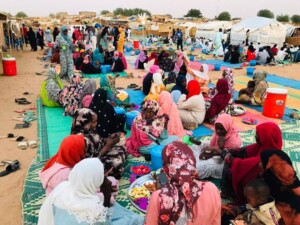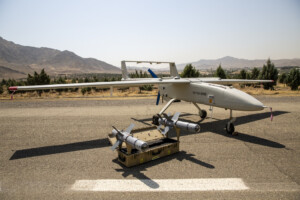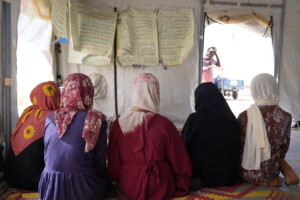Interview with Awadiya Abbas: Women’s union organiser and revolutionary
For Radio Dabanga’s Inspirational Women series* we interviewed Awadiya Abbas, President of the Women’s Cooperative Association of Popular Food and Beverage Sellers, trade unionist, and revolutionary activist. She spoke to us about her early political trade union activism, the start of the women’s union for food and beverage sellers, and her participation in the revolution.
 Awadiya Abbas, President of the Women’s Cooperative Association of Popular Food and Beverage Sellers, a women's union that predominantly defends the rights of tea vendors (RD)
Awadiya Abbas, President of the Women’s Cooperative Association of Popular Food and Beverage Sellers, a women's union that predominantly defends the rights of tea vendors (RD)
For Radio Dabanga’s Inspirational Women series* we interviewed Awadiya Abbas, President of the Women’s Cooperative Association of Popular Food and Beverage Sellers, trade unionist, and revolutionary activist. She spoke to us about her early political trade union activism, the start of the women’s union for food and beverage sellers, and her participation in the revolution.
Good morning, good evening
You woman of the house and the office, sitting at a desk facing the audience
All spic and span, while you earn your income with great fatigue and effort
You wake up early at dawn, you arrange your shirt and veil
You recite the anthem and the surah
I love the way you work, I love the sweat dripping from you
I love tea with rusk.
The words of the poet Mahjoub Sharif represent Awadia and her colleagues well as they work and move around in front of the office of their union at the popular market of Khartoum.
Awadiya Abbas Marajan Mohamed has been a long-time, experienced, and progressive union organiser since 1969 and has been the secretary-general and treasurer of the women’s food and tea vendors union before becoming its president.
Her journey of hard labour began at the age of sixteen when she joined the National Textiles factory in 1969, and then the Textard Ready-made Garments factory in Khartoum in 1974. She joined Textard after she was arrested and had to leave the national textiles, one of the many chapters in her political struggle for labour rights.
Early trade union work
Her work as a trade unionist started when she became a member of the National Textile Workers Union in 1969, when she joined the factory. She was arrested after the July 1971 movement in which communists tried to take over from Jaafar Nimeri’s one-party government, which had come to power through a military coup in 1969.
She said: "I became a union member in 1969 and was the treasurer of the Workers' Youth Committee during the days of [Communist Trade Unionist and Labour Minister] Shafee Ahmed El Sheikh. After the July 1971 movement, I was arrested for being a communist and dismissed from work."
Around the same time, Awadia was an active member of the Sudanese Women’s Union. She was a member of the union’s executive committee before its dissolution in 1971.
'After the dissolution of the union in May that year, we continued our work in secret through the neighbourhood branches'
She recalls: “I was elected to the Women’s Union’s last committee in 1971 with Fatima Ahmed Ibrahim, Fatima Saeed, Mahasin Khider, Hamida Baroud, Souad Hamdan, and others. After the dissolution of the union in May that year, we continued our work in secret through the neighbourhood branches… We used to meet secretly in turns in the homes of Fatima El Gadal, Fatima Ahmed Ibrahim, or Fatima Saeed. Our movement was active.”
A new chapter in the face of the Public Order Law
In the face of stressful economic conditions and with her desire to become self-reliant, something she was accustomed to since her childhood, she was forced to go to the El Sajana market to start a new career as a popular food seller in 1994, a job that proved another significant chapter in her life as an activist.
In Sudan, food and 'tea' (hot beverages) vendors are mainly women, often displaced or migrants from rural areas, and they were frequently harassed and prosecuted under the Omar Al Bashir regime.

Awadiya's work as a vendor on the market was fraught with hurdles and confrontations with the authorities based on the notorious, now supposedly defunct, public order law. This law targeted women in particular. “Students, working women, and especially food and tea vendors have received the lion's share of physical and verbal violence,” Coordinator of the No to Women’s Oppression Initiative Ihsan Fagiri told Radio Dabanga in 2017.
Awadia and her colleagues took part in the marches and vigils in front of the authorities to protest the law.
'They attacked us at our office and took our chairs because we resisted their decision to limit our work hours until six o'clock… But we continued to resist'
She explains: “To combat the public order law, we held vigils and marches in many localities and met with many officials. Prosecuted by authorities, I arrived at our main office…They attacked us at our office and took our chairs because we resisted their decision to limit our work hours until six o'clock… But we continued to resist.”
She tells about her experience with the kashat, as Public Order Police swoops are called, and the trials: "The kashat always came to us… The day the Public Order Court brought me to court, the judge told me that what we do is not in line with faith. I told him we want to live halal, which means that we don’t plunder and steal.”
Before the Public Order Law was repealed, Awadiya told SudaneseOnline that the kashat are insulting. She organised a celebration on International Women’s Day in the Omdurman Women’s Prison and explained that the suffering of women in marginal professions is great due to continuous controls, checks, and fines at the hand of the Public Order Police. She also told SudaneseOnline “that a woman can reach success just like a man and have a great impact on her family, her family, and society as a whole”.

Politically organising the food and beverages sales sector
The first steps towards organising the sector of popular food and beverage vendors into a union were taken with the Sudanese Development Association, which was conducting a case study on that group of women.
It was with the help of this association that they started organising women vendors in a cooperative association with the aim of supporting them and defending their rights.
They started with the establishment of three offices in the mid-nineties in the El Shaabi market in Khartoum, the Abu Zeid (Libya) market in Omdurman, and the Haj Yousef area of Khartoum North, with the help of the Sudanese Development Association and Oxfam, Awadiya explains. She was in charge of procurement.
'We got acquainted with the criminal and civil laws. We knew our rights and duties'
"We managed to buy the buildings to start the cooperative work… We were also given capital for the work materials top operate four restaurants in each office and to distribute to restaurants in the neighbourhood. We developed as a group and were trained in cooperation, public health, and environmental health, and we got acquainted with the criminal and civil laws. We knew our rights and duties. Each one has obtained more than 17 training certificates since 1995.”
The Indian womens’ unions were a source of inspiration for Awadiya and her comrades on their journey to India in 1995. She said: "We spent 15 days in India with my colleagues Awadiya Mahmoud Kuku, Nafeesa El Nasri, Khadija Jadallah and others. We studied and learned from their financial system; they were able to establish their own savings bank to lend money for the purposes such as the education of their children and support with other needs."
During her tenure as Secretary-General, Awadiya Abbas was active in protecting tea sellers from harassment by affording them registration cards and formalising their work in the “Kofti Boxes Project” in cooperation with the Crafts Cooperative Union, which created a “kiosk” for each tea seller.

An outstanding role in the revolution
Women vendors of popular foods and drinks played a remarkable role in the December revolution and their presence in the 2019 sit-in in front of the general army command that led to the ousting of dictator Omar Al Bashir.
Women made up an estimated 70 per cent of these mass demonstrations. A photo of a woman wearing white, addressing protesters from a car rooftop, became a widely shared and defining image of the revolution.
'I went back early in the morning, and I did not return home until after a week'
Awadiya told us: “I used to participate in the protest marches on an ongoing basis. On April 6, I walked from the central market in Khartoum with the people of El Azhari, amid chases and pursuits by the security men, until we reached the gate of the General Command of the Sudanese Army. On that day, I sat outside the General Command until ten o’clock. The second day I went back early in the morning, and I did not return home until after a week… We were staying with my colleagues to prepare food and drinks for the sit-in.”
On June 3, 2019, two days before the end of Ramadan, the large sit-in in front of the army’s General Command was broken up with excessive violence. More than 127 protesters were reportedly killed. The bodies of 40 of them were found floating in the Nile. More than 700 others sustained injuries, and at least 100 people went missing in the June 3/Ramadan 29 massacre.
Family history
Awadiya Abbas Marajan Mohamed was born in the El Sajana neighbourhood of Khartoum in 1954 and she studied at El Sajana Primary School. Later she went to the English mission CNS in Omdurman but she did not complete her education due to difficult economic conditions.
In 1975, she married Mustafa Mohamed Sharafeldin, a laboratory technician at Khartoum Hospital. Together they have three daughters and two sons, all of whom received university education. At the moment, they have six grandchildren.
* More from the Inspirational Women series:
Interview with novelist Sara El Jak on literature, womanhood, and empowerment
Interview with Nuba Kandaka Safaa Tutu: A Story of Resilience and Struggle
Interview with Nisreen El Saim: The December Revolution's Kandaka and a global climate activist











 and then
and then